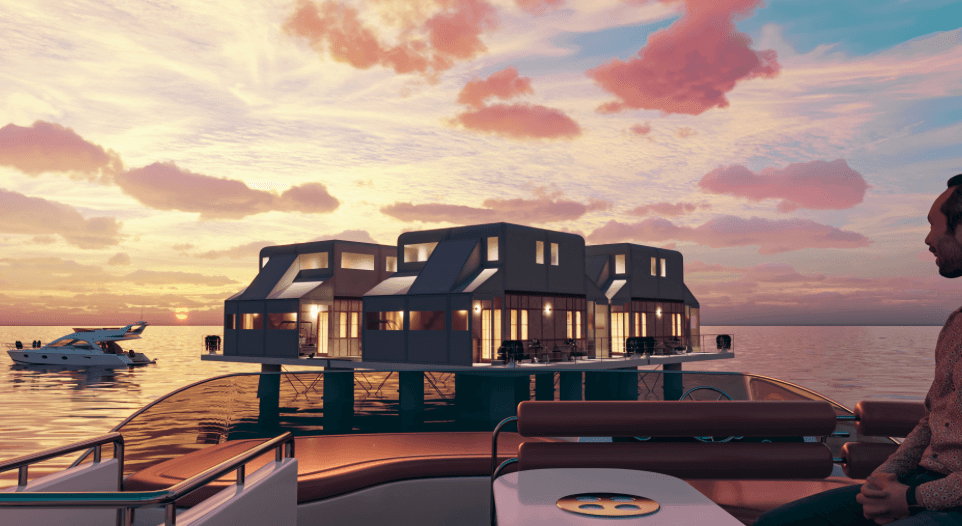Table of Contents
Coinscribble – February 21, 2024 / Stead is an Arbitrum-based DeFi platform (Stead.Builders) that provides liquidity for small marine businesses, fishermen, and fish farmers, most of whom are unbanked or operating in developing countries.
The platform supports numerous types of floating infrastructure, like fishing and transport boats, fish cages, floating docks, and, most impressively, floating houses, hotel rooms, and restaurants.
The platform started when the marine engineering company ArkPad, operating out of the Philippines, wanted to help customers to acquire mortgages for its floating houses.
Getting a mortgage is already difficult enough considering the huge down payments that need to be made, but securing a mortgage for a floating house is another story entirely. Most banks unfamiliarity with unconventional real estate means they pass it over for investment, so ArkPad helped to create the Stead platform in order to decentralize the funding process for floating infrastructure.
From Floating Homes to Financial Aid
While Stead’s initiative for supporting floating houses is tremendously unique, what also sets the company apart is additionally assisting unbanked small businesses in the Philippines and Southeast Asia.
In many developing countries, a large portion of the population is bankless or prevented from accessing loans to expand their businesses. Key reasons include banks having excessive regulations, bureaucratic hurdles in account opening, or simply having relatively small amounts of capital available for loans in the first place. Additionally, on an archipelago nation like the Philippines, many banks simply don’t have any branches present on islands where valuable fish, like Yellowfin Tuna, can be found. In such cash-based societies, lack of physical access to a bank simply means going unbanked.
Stemming from these challenges, many developing countries suffer from having highly unbanked populations, a fertile ground for crypto to fill the unused space.
Building Blocks for Floating Communities
Turning its dreams into a reality, Stead offers a solution like no other, providing liquidity to small businesses, including fisherman, through STEAD tokens.
Upon minting STEAD, stables are put into a pool to purchase a particular asset. In this case, let’s say for a fisherman wanting to purchase a fishing boat. Once enough capital has been garnered to acquire this Real-World Asset (RWA), the fisherman can reap their rewards through the token’s ‘lease-to-own’ program, buying back and burning the STEAD tokens that were initially issued to fund them.
Amplifying the company’s uniqueness, STEAD acts as a ticket to reserve time with the asset. The fisherman can lease time with the boat by burning STEAD, and after a greater dollar amount amounthave been burned than were initially minted, they will be transferred full ownership of it. Therefore, the token goes beyond being just RWA; it has an intriguing deflationary supply.
Not only does this burning mechanism result in a reduced circulating supply, but another mechanism is built into the minting mechanics. While STEAD has no maximum supply, the minimum cost to mint a token increases by around 11.4% annually, if price drops below that, minting stops. This means that while the token has no maximum price, the minimum price that it can have is constantly increasing, a novel mechanic not seen in any other token.
A Financial and Architectural Revolution
Spearheaded by Stead’s Co-Founder, Mitchell Suchner, Stead is working hard to make financial resources more easily accessible in Southeast Asia.
RWA tokens are an important emerging niche of crypto, and Stead stands to facilitate some of the most important transactions to serve some of the most profitable, and simultaneously under-served communities, but there is more that sets this project apart from others, and that is there long termgoal.
During the first stage of operations, the platform intends to focus on the Southeast Asian market, but during the later stages, they plan to partner with small island nations, DAOs, and other organizations to facilitate the construction of whole floating cities.
Floating city being facilitated and backed by the STEAD token
The idea of building floating cities in national or international waters has been around for a while, called ‘seasteading’ advocates want to create independent floating jurisdictions of self-run communities where crypto friendly businesses can thrive.
Using ships, docks, and floating houses, communities and villages can be built and connect together to share resources such as fresh water, electricity, and fiber optic cables for internet. Far from being a fantasy, the first floating house has already been built in Boracay, Philippines, with some coastal resorts in the country already planning to purchase their own for listings on AirBnB.
Will Stead’s ultimate dream of building an entirely floating blockchain city become a reality? Only time will tell. However, the technology is here, and buoy, is it impressive.
Disclaimer: This is a sponsored press release and is for informational purposes only. It does not reflect the viewsof Crypto Daily, nor is it intended to be used as legal, tax, investment, or financial advice.
Investment Disclaimer

